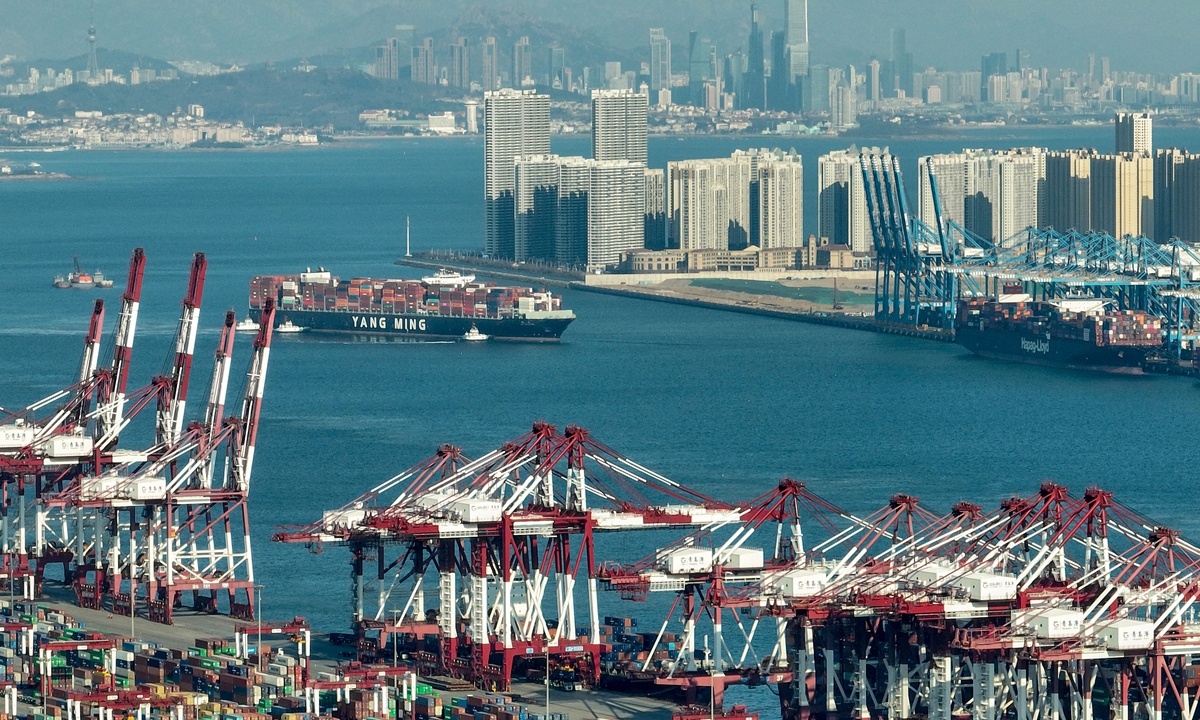
A busy Qingdao port in Shandong Province on February 6, 2022. China's container shipping sector registered steadfast growth despite headwinds from the COVID-19 pandemic and container shortages, indicating the country's robust foreign trade and economic resilience. Photo: cnsphoto
Facing a complex global environment, China's foreign trade has withstood the test of major risks and demonstrated strong resilience over the past year, with import and export estimated to hit a new record in 2022, the Commerce Ministry said on Thursday.
The full-year numbers are scheduled for release on Friday.
From January to November, total foreign trade reached 38.34 trillion yuan ($5.5 trillion), up 8.6 percent year-on-year, which means the amount for the first 11 months was already close to the full-year volume for 2021.
Foreign trade reached $6.05 trillion in 2021, surpassing the $6 trillion mark for the first time. Exports surge 29.9 percent and imports rise by 30.1 percent in the full year of 2021.
"In 2022, the scale is expected to have reached a new high," Shu Jueting, a spokesperson of the Commerce Ministry, told reporters on Thursday.
Looking ahead at this year, Shu said the rising risk of a global recession and the continued slowdown in external demand are exerting the greatest pressure on the growth of foreign trade.
The global economy is "perilously close to falling into recession," according to the latest forecast by the World Bank. It expects the world economy to grow by just 1.7 percent in 2023 - a sharp decrease from the 3 percent it predicted in June.
Shu noted that as more firms have been actively "going out" and looking for orders from overseas customers, there have emerged positive signs - some major provinces are receiving increasing orders.
In the most recent case, South China's Guangxi Zhuang Autonomous Region on January 6 sent out its first business delegation after the pandemic struck in early 2020, to pursue more overseas orders.
The delegation visited a number of countries in the Association of Southeast Asian Nations, including Cambodia, Malaysia and Singapore.
Northeast China's Jilin Province sent a delegation to South Korea, and Northwest China's Xinjiang region sent a delegation to Central Asian countries in December. These were preceded by earlier efforts by East China provinces such as Zhejiang and Jiangsu to seek orders overseas.
Active moves by foreign trade companies to explore markets and their vigorous development of new forms of foreign trade will help China's export sector to keep an appropriate growth rate despite shrinking external demand, Bai Ming, deputy director of the international market research institute at the Chinese Academy of International Trade and Economic Cooperation, told the Global Times.
Due to the country's anti-COVID optimization, businessmen will soon be able to travel on their own initiative in a more flexible and timely fashion, which will boost China's foreign trade, Bai said.
For 2023, Shu said the task of stabilizing export and import is "arduous," stressing that the ministry will monitor the situation, strengthen support for firms.
The official said that the ministry will optimize relevant work in three ways this year. First, to stabilize foreign trade orders and give full play to the role of foreign business organizations, and to support foreign trade enterprises to participate in overseas exhibitions.
Second, it will guide relevant departments to give full play to the role of various financial institutions, and further increase credit support for foreign trade enterprises, especially micro-sized, small and medium-sized ones.
The third is to help enterprises solve difficulties, make full use of the working mechanism related to stabilizing foreign trade, and promptly understand and promote the resolution of problems faced by enterprises.
Zhang Hong, an independent analyst, told the Global Times on Thursday that he's optimistic about the prospects this year for China's export and import, which is set for a "strong rebounding."
He said that trade should stabilize in the first quarter, since the adjustment of the COVID-19 strategy will drive up internal demand, which will be beneficial to imports growth.
The recovery of the Chinese economy will also provide strong momentum for the global economic recovery, which will boost cross-border investment and trade as well, the analysts said.




